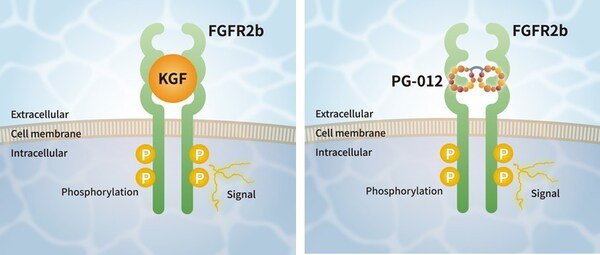PeptiGrowth to Launch Synthetic KGF Alternative Peptide PG-012 in April 2025 for Regenerative Medicine Applications
02 April 2025 | Wednesday | News

Mechanism of Action of PG-012, a KGF Alternative Peptide
PeptiGrowth Inc. (Headquarters: Chiyoda-ku, Tokyo, President: Junichiro Ishizuka) has successfully developed a novel synthetic peptide called "KGF alternative- peptide (FGFR2b agonist)" which is functionally equivalent to recombinant keratinocyte growth factor (KGF). This product will be on the market beginning April 2025.
Development of Synthetic Peptide Growth Factors by PeptiGrowth
Conventional growth factors and cytokines used in the manufacturing of regenerative medicine and cell therapy products face various quality challenges such as lot-to-lot variation, potential contamination with biological impurities, low stability, and high cost. PeptiGrowth has been working on the development of a series of synthetic peptides that can address these challenges while maintaining equivalent function to the conventional growth factors and cytokines on the market. Our peptides are completely chemically synthesized and animal component-free, enabling xeno-free and chemically defined cell culture media.
About KGF alternative peptide (FGFR2b agonist) [Product code: PG-012]
- Mechanism of activating FGFR2b by the KGF alternative peptide (PG-012)
PG-012, KGF alternative peptide, is a dimeric peptide composed of cyclic peptides designed to bind specifically to FGFR2b. Like KGF, PG-012 effectively interacts with FGFR2b and exhibits agonistic activity against FGFR2b (see diagram below).
- Comparable signal activation activity to recombinant KGF

"ERK phosphorylation and cell proliferation activity of PG-012 and KGF in FGFR2b-overexpressing BaF cells.
We conducted a comparative study on the functions of KGF alternative peptide (PG-012) and commercially available recombinant KGF using FGFR2b-overexpressing BaF3 cells. We confirmed that the KGF alternative peptide activates ERK (upper left figure) and exhibits proliferation activity (upper right figure) in a manner similar to recombinant KGF at lower concentrations (ng/mL basis).
We anticipate that the KGF alternative peptide (PG-012) will be applicable in regenerative medicine and cell therapy, particularly in applications such as differentiation and proliferation of epidermal cells and cells derived from the endoderm, such as alveolar epithelial cells, islet cells, and hepatocytes, from pluripotent stem cells.
Most Read
- How Does GLP-1 Work?
- Innovations In Magnetic Resonance Imaging Introduced By United Imaging
- Management of Relapsed/Refractory Multiple Myeloma
- 2025 Drug Approvals, Decoded: What Every Biopharma Leader Needs to Know
- BioPharma Manufacturing Resilience: Lessons From Capacity Expansion and Supply Chain Resets from 2025
- APAC Biopharma Review 2025: Innovation, Investment, and Influence on the Global Stage
- Top 25 Biotech Innovations Redefining Health And Planet In 2025
- The New AI Gold Rush: Western Pharma’s Billion-Dollar Bet on Chinese Biotech
- Single-Use Systems Are Rewiring Biopharma Manufacturing
- The State of Biotech and Life Science Jobs in Asia Pacific – 2025
- Asia-Pacific Leads the Charge: Latest Global BioSupplier Technologies of 2025
- Invisible Threats, Visible Risks: How the Nitrosamine Crisis Reshaped Asia’s Pharmaceutical Quality Landscape
Bio Jobs
- Sanofi Turns The Page As Belén Garijo Steps In And Paul Hudson Steps Out
- Global Survey Reveals Nearly 40% of Employees Facing Fertility Challenges Consider Leaving Their Jobs
- BioMed X and AbbVie Begin Global Search for Bold Neuroscience Talent To Decode the Biology of Anhedonia
- Thermo Fisher Expands Bengaluru R&D Centre to Advance Antibody Innovation and Strengthen India’s Life Sciences Ecosystem
- Accord Plasma (Intas Group) Acquires Prothya Biosolutions to Expand Global Plasma Capabilities
- ACG Announces $200 Million Investment to Establish First U.S. Capsule Manufacturing Facility in Atlanta
- AstraZeneca Invests $4.5 Billion to Build Advanced Manufacturing Facility in Virginia, Expanding U.S. Medicine Production
News











